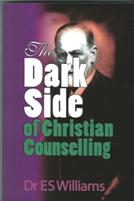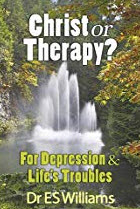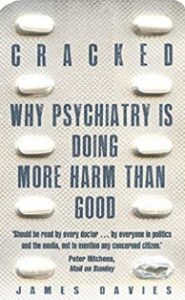The folly of the Christian counselling movement
The purpose of this article is to describe the Christian counselling scene in the UK, a new form of ministry that has developed over the last four decades and that is having an enormous impact on the Christian Church. The psychological ideas that drive Christian counseling have found acceptance across a wide spectrum—evangelicals, Catholics, charismatics and liberals have all embraced this new ministry.
A visit to the local Christian bookshop will show that books with a psychological flavor, that offer guidance on stress, inner pain, conflict resolution and low self-esteem are best-sellers. The Wesley Owen website, the largest organisation selling Christian books in the UK, has 13 pages that deal with Christian psychology and 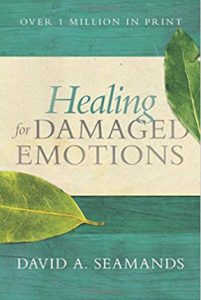 counselling, listing well over 200 titles. A sample of the books include: The ABC of Emotions, The Book of Big Feelings, Letting Go of Worry and Anxiety, No More Hurting, Overcoming Hurts and Anger, Putting your Past Behind You, Building Self-Esteem, Winning Over Your Emotions, etc.
counselling, listing well over 200 titles. A sample of the books include: The ABC of Emotions, The Book of Big Feelings, Letting Go of Worry and Anxiety, No More Hurting, Overcoming Hurts and Anger, Putting your Past Behind You, Building Self-Esteem, Winning Over Your Emotions, etc.
A therapeutic gospel
One of the fruits of Christian counselling scene is the emergence over the last three decades, of a new therapeutic gospel, that aims to meet the psychological needs the congregation. The therapeutic gospel aims to make its adherents feel loved, significant, and entertained. It is an inoffensive gospel that seldom, if ever, mentions sin and judgment for fear of making the message appear unattractive, and even worse, because to do so makes people feel guilty. It is a comfortable gospel that ignores God’s wrath and holiness. It is a gospel that offers salvation from low self-esteem, not from sin.
Contemporary worship has become a vehicle for expressing the therapeutic gospel. God is presented as the one who meets our emotional needs and makes us feels good about ourselves. As one praise song puts it: ‘He heard my cry and came to heal me, He took my pain and He relieved me, He filled my life and comforted me, And His name will shine, shine eternally.’[1] Worship Songs of the Vineyard provide another example of the therapeutic gospel: ‘I need you to hold me, Like my daddy never could, And I need you to show me, How resting in your arms can be so good’[2] The modern songs that have replaced traditional, doctrinally sound hymns, in the majority of evangelical churches, have a strong focus on me, my emotional needs and longings.
In article we examine the ideas and assumptions that lie behind the counselling scene. Our task is to address the question. Does the Church benefit from integrating psychological truth and Scripture?
The growth of the Christian counselling movement
The story of the Christian counseling movement starts 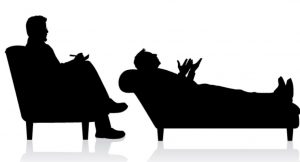 in the USA after the Second World War when many pastors began to feel that they were not properly trained to deal with the problems of daily living that were becoming increasingly common. Pastors were persuaded that Christians suffering with deep inner hurts needed counselling by a psychotherapist. They were urged not to meddle with psychological problems for which they had not been properly trained.
in the USA after the Second World War when many pastors began to feel that they were not properly trained to deal with the problems of daily living that were becoming increasingly common. Pastors were persuaded that Christians suffering with deep inner hurts needed counselling by a psychotherapist. They were urged not to meddle with psychological problems for which they had not been properly trained.
In the mid 1960s Fuller Theological Seminary in the USA, having taken a liberal position on Scripture, developed a School of Psychology 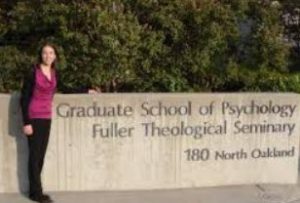 to run alongside its School of Theology. Psychological counselling fitted perfectly into Fuller’s vision of a social gospel. Over the last four decades Fuller’s training program has been committed to integrating psychology and theology and has had a major impact on the development of Christian counselling in the USA and also in the wider world.
to run alongside its School of Theology. Psychological counselling fitted perfectly into Fuller’s vision of a social gospel. Over the last four decades Fuller’s training program has been committed to integrating psychology and theology and has had a major impact on the development of Christian counselling in the USA and also in the wider world.
The Christian counselling movement gained momentum during the 1970s and 1980s when many young evangelicals were persuaded to take up careers in psychology. Key personalities were James Dobson, Bruce Narramore, Gary Collins and Tim LaHaye among others. A feature of these men was their ability to write self-help books that used psychological theories, tempered with Christian ideals, on issues such as self-image, personal growth and parenting.
In the 1970s Dr Larry Crabb, a prominent Christian 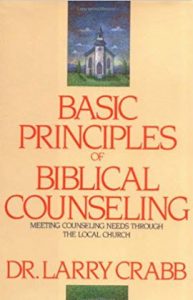 psychologist, published the book, The Basic Principals of Biblical Counseling (1975) that sought to provide a theoretical justification for the Christian counseling movement. Dr Crabb’s theory of Christian counselling has been actively promoted in the church throughout the Western world. He has written over 20 books which are best-sellers and used in theological colleges around the world, including the UK. Crabb is deeply integrationist in his approach, believing that valuable insights can be culled from the world of psychology.
psychologist, published the book, The Basic Principals of Biblical Counseling (1975) that sought to provide a theoretical justification for the Christian counseling movement. Dr Crabb’s theory of Christian counselling has been actively promoted in the church throughout the Western world. He has written over 20 books which are best-sellers and used in theological colleges around the world, including the UK. Crabb is deeply integrationist in his approach, believing that valuable insights can be culled from the world of psychology.
While the ideas that gave rise to the Christian counseling movement came largely from the USA, they rapidly spread across the Atlantic. Many churches were eager for a ministry that helped hurting Christians and the teachings of Larry Crabb, James Dobson, Gary Collins and others proved to be irresistible.
Selwyn Hughes of CWR
Selwyn Hughes has probably done more than any other to promote the Christian counselling movement in the UK. His book, Christ Empowered Living, tells us how he came to understand that truths from secular psychology 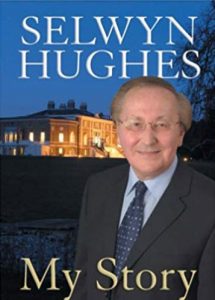 had a lot to offer the church. As a young charismatic evangelist he set up the organisation called The Crusade for World Revival (CWR) which now specialises in training Christians in the skills of psychological counselling.
had a lot to offer the church. As a young charismatic evangelist he set up the organisation called The Crusade for World Revival (CWR) which now specialises in training Christians in the skills of psychological counselling.
Hughes was greatly influenced by Larry Crabb. He found Crabb’s books superb. He writes: ‘my heart resonated with everything he was saying. The more I read the more I wanted to meet this man’. Hughes’ wish was granted when he attended a week long course at the Institute in Biblical Counseling in the USA. As he listened to Crabb he kept saying to himself, ‘This is what I have been looking for all my life!’[3] Hughes’ encounter with Crabb transformed his thinking. He felt like someone had given him a million dollars, for he had learned priceless ideas which he could use to reconstruct CWR’s counselling courses to make them even more effective in helping people with their problems. By incorporating Crabb’s ideas, Hughes was convinced that CWR could make an even bigger contribution to the ministry of biblical counselling in the UK. At last Hughes had found his true calling—not world revival but psychological counselling.
Since the early 1990s CWR (it seems that it no longer likes to be known as the Crusade for World Revival) has been running courses to train Christians in the theory and practice of counselling. The distinctive feature of their courses is that they integrate biblical understanding with psychological models of counselling. Here it is important to note that the CWR model, like most Christian counselling in the UK, is integrationist in its approach.
The London School of Theology, working in partnership with CWR, offers degrees in Theology & Counselling. The partnership, which began in 1998, has resulted in a training programme which draws on the best that secular counselling models can provide, integrates it with theological principles, and builds out of that integration a counselling practice which is both professionally recognized, and, they claims, faithful to Christian principles.
The Watford Christian Counselling Centre is a good example of Christian counselling that comes from the CWR stable, for all the counselors have been trained by the London School of Theology. The Centre, which is a member of the British Association of Counselling and Psychotherapy (BACP), offers confidential counselling that aims to help with a wide range of problems including depression, bereavement and loss, stress, anxiety, marriage or relationship difficulties and so on. According to the Centre, ‘We use an integrative model of counselling incorporating aspects of psychodynamic therapy, narrative therapy, and rational-emotive behaviour therapy.’ There are hundreds of similar counselling services across the UK.
While CWR and the London School are leaders in training Christians in the theory and practice of counselling, there are over 30 other organisations in the UK, including many theological colleges, that do the same. This means that large numbers of Christians, mostly women, are being trained in the ways of the counselling movement.
The Churches’ Ministerial Counselling Service is a network of professional counsellors run by the Baptist Union and sponsored by the Baptist Union, the Methodist Church, the Salvation Army, the United Reformed Church and the Free Churches’ Group. The network provides psychological services for ministers and their families. Professional counsellors who can be consulted anonymously, so that no records are available to any Baptist Union staff concerning who uses the service.
The Minister’s Counselling Service provides non-directive counselling that enables the pastor to reach a deeper understanding of his problems, so that he can cope more effectively with life. Counsellors charge professional fees, and each denomination makes up the difference between what the client can afford and the full fee.
Ministers are assured that the service is trustworthy because the counsellors are recognized by the British Association of Counselling and Psychotherapy (BACP). They are also assured that their visit to a counsellor is totally confidential so that nobody in their church will know that they are receiving psychological counselling. It is amazing that Christian ministers have placed their trust in the BACP. It is even more amazing that Christian ministers feel the need for non-directive psychotherapy to deal with their problems. Is the God of all comfort, who comforted the apostle Paul in all his tribulations unable to comfort the troubled ministers of today? (2 Corinthians 1:3-4).
Spurgeon’s college
Since the 1990s Spurgeon’s Theological College has been training students in the skill of psychological counselling. The courses are recognised as components towards meeting the criteria for professional accreditation with the British Association for Counselling and Psychotherapy (BACP). Students are taught that psychological theories about human nature have produced counselling models that are psychodynamic, cognitive-behavioural and humanistic in approach.
The Evangelical Alliance
The Evangelical Alliance in collaboration with CWR set up the Care for Pastors Network with the purpose of offering the clergy and other Christian leaders counselling, health checks, discounted holidays and retreats. The Alliance’s deep commitment to the Christian counselling movement is clear from its website, which provides links to a number of organisations, such as CWR, The Institute of Counselling and the Oxford Christian Institute for Counselling, to mention a few of the more well known.
Counselling takes hold in the Anglican Church
The Anglican Association of Advisers in Pastoral Care and Counselling, founded in 1996, exists to promote both pastoral care and counselling within the dioceses of the Anglican Church. Each diocese provides a counselling service for clergy and their families. Holyrood House Centre for Health and Pastoral Care provides a safe place where clergy can feel empowered to work towards their own healing. Clergy go to the Centre for counselling, psychotherapy, art and drama therapy, stress management and meditation, among other things. For many, counselling and psychotherapy becomes an important part of this process.
The Association of Christian Counselling (ACC)
The Association of Christian Counselling was established in 1992 to give counselling credibility in the eyes of the churches. Following  discussions with a number of Christian counselling organisations across the UK, it was decided to set up an umbrella organisation which could provide a system for the accreditation of counsellors broadly acceptable to churches. The Association recognizes that among Christians there is a great variety of approaches to counselling, and so it does not seek uniformity.
discussions with a number of Christian counselling organisations across the UK, it was decided to set up an umbrella organisation which could provide a system for the accreditation of counsellors broadly acceptable to churches. The Association recognizes that among Christians there is a great variety of approaches to counselling, and so it does not seek uniformity.
A scan through the 400 entries in the UK Directory of Christian Counselling gives a good idea of the range of problems that are being address. Many counsellors offer non-directive counselling for women with an unwanted pregnancy. Some offer integrative counselling for all areas of emotional and relationship problems, low mood, bereavement, abuse issues, stress, family matters and low self-esteem. Others offer counselling for inner healing, spiritual issues, spiritual mentoring and coaching. Yet others offer counselling for unresolved childhood issues and sexual abuse.
This brief survey shows that the Christian counselling movement has swept like a tidal wave across the USA, and a decade later, across the UK. It is now a highly organized industry and there is hardly a church in the country that has not been touched in some way. Most branches of the Christian faith, including Charismatics, Evangelicals and Anglicans, have eagerly embraced all that the movement has to offer. Some churches have their own counselling service, some have trained counselors, some have counselling seminars for their congregation, most have self-help books on their bookstall, and most churches refer members with emotional problems for counselling. Such is the enthusiasm for counselling among evangelicals that the recent New Word Alive conference held a seminar on low self-esteem, run by an Associated Minister from All Souls Langham Place.
Remarkably, there has been little, if any, opposition to the Christian counselling industry in the UK. Led by CWR, the London School of Theology, the Evangelical Alliance and Spurgeon’s college, and with main stream evangelical churches committed to the psychological way, there are few people prepared to question the underlying ideology that drives the Christian counselling movement.
Integration
Does the Church benefit from integrating psychological truth and Scripture? As we have already seen, the Christian counselling industry is based on an integration model that attempts to incorporate the truths of secular psychology with biblical teaching. A key argument used by integrationists is that all truth is God’s truth, wherever it is found.[4] It follows that what is currently believed to be ‘true’ through science or psychology is just as surely true as truth revealed in Scripture. We are asked to accept that the psychological theories of men have acquired a standard of truth that allows them to stand alongside God’s revealed, eternal word.
Scripture teaches that God’s words are not simply true in the sense that they conform to some standard of truthfulness outside of God. Rather, they are truth itself—they are the final standard and definition of truth. So Jesus can say to the Father, ‘Your word is truth’ (John 17:17). The error of the ‘unity of truth’ doctrine is that it does not recognize the fundamental distinction between the revelation of Scripture and the wisdom that comes from flawed human reason. That the so-called psychological ‘truth’ of today is the failed psychological theory of tomorrow.
So what are the psychological theories that are being integrated with Scripture? Despite obvious flaws in the unity of truth concept, mainstream Christian counselling seeks to integrate the best parts of Sigmund Freud’s psychotherapy, Carl Rogers’ non-directive counselling, Albert Ellis’ rational emotive behavioural therapy, Aaron Beck cognitive therapy and Abraham Maslow’s needs related psychology, into its armory.
Sigmund Freud
Freud’s great contribution to psychological theory is his invention of the unconscious mind, which he claimed, to a large degree, controls human behaviour. The concept of the unconscious forms the bedrock of most forms of psychotherapeutic counselling and is an essential component of the Christian counselling movement.
Selwyn Hughes, doyen of the British Christian counselling movement, found Freud’s theory of the unconscious very helpful in his counselling ministry. He agrees that Freud’s statement – ‘neurosis is the exchange of one pain for another’ – makes a lot of sense.[5] Hughes speaks of ‘an unconscious mechanism designed to dampen’ devastating feelings of the soul,[6] and explains that for years he has ‘spent a lot of time digging into people’s pasts in order to find an explanation for their behaviour’.[7]
Crabb uses the metaphor of an iceberg, commonly used by secular psychoanalysts, to explain the unconscious. He is frustrated that many evangelical Christians are sceptical when psychologists go on about the unconscious. Crabb claims that evangelical Christians ignore the sin that lies in the unconscious, 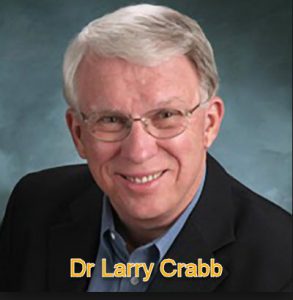 for Pastors work only above the waterline and so produce people, who below the waterline, are filled with unrecognized corruption.[8]
for Pastors work only above the waterline and so produce people, who below the waterline, are filled with unrecognized corruption.[8]
In effect, Crabb is saying that no one can live a victorious Christian life without a therapist delving into the recesses of their unconscious. The gospel of Christ is only able to deal with sin above the waterline; Freud’s psychoanalysis is needed to deal with the sin that lies below the waterline. This is not only profound nonsense, it is false teaching. It is the living and powerful word of God that is a discerner of the thoughts and intents of the human heart. It exposes sin in our inward parts and calls for true repentance. To advocate that Christians need the teaching of Freud to obtain inner cleansing from sin is another gospel.
What is not widely known is that Sigmund Freud had a deep interest in the occult and also a passion for cocaine. An important driving force behind Freud’s development of psychotherapy was an intense hatred of the Christian faith. In The Memory Wars (1995) Professor Frederick Crews convincingly dismantles the entire Freudian enterprise, from beginning to end. Freud’s dynamic unconscious turns out to be ‘a morass of contradictions’.[9] Crews concludes that Freud ‘has been the most overrated figure in the entire history of science and medicine—one who wrought immense harm through the propagation of false etiologies, mistaken diagnoses, and fruitless lines of inquiry’.[10]
The Christian counselling movement, that freely uses the technique of psychoanalysis, is asking us to accept that Freud’s theory of the unconscious is founded on psychological truth. The Church is being persuaded to believe that Christians benefit from the integration of Freud’s teaching with Scripture.
Carl Rogers
An article in the American Psychologist in 1982 ranked the ten most influential psychotherapists in history. Carl Rogers was first, followed by Albert Ellis and Sigmund Freud. As a leader of the humanist school of psychology, 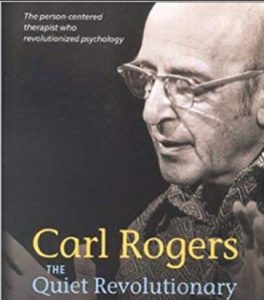 Rogers sees humans as motivated toward good behaviour. His scheme is based on the idea of one life-force, a power that he calls the ‘actualizing tendency’. He stresses the importance of self-esteem and identifies the human need for positive unconditional self-regard.
Rogers sees humans as motivated toward good behaviour. His scheme is based on the idea of one life-force, a power that he calls the ‘actualizing tendency’. He stresses the importance of self-esteem and identifies the human need for positive unconditional self-regard.
Rogers developed a non-judgmental, non-directive model of counselling that helps a client achieve personal growth. Rogers wants a client to be free to own and express his true feelings. A client must trust his feelings and do what ‘feels right’ in a particular situation. The emphasis on feelings, that is now such a part of Christian counselling, owes much to the psychological approach of Carl Rogers. As Selwyn Hughes points out, ‘The more aware we are of our feelings, the sooner we recover from them… When an emotion arises, don’t attempt to deny it or pretend it is not there. Face it and feel it.’[11] Yet Rogers’ great emphasis on feelings is contrary to the teaching of Scripture. ‘A fool vents all his feelings, but a wise man holds them back’ (Proverbs 29:11). It is foolishness to think that our feelings will provide a reliable guide to how we should behave.
Rogers arrogantly asserted that his experience is, for him, the highest moral authority. He wrote: ‘Neither the Bible nor the prophets – neither Freud nor research – neither the revelations of God nor man – can take precedence over my own direct experience.’ A key objective of Rogers therapy is the promotion of self as the ultimate moral authority. Rogers’ view of authority leads to a moral relativism where each person is free to decide their own moral standards—there is no place for the moral absolutes of God’s law.
The legacy of Rogers’ non-directive, non-judgmental ideology can be found in the school classroom and the abortion counselling office. William Kilpatrick, professor in moral education, explains that Carl Rogers’ method of counseling that has had a massive influence on our culture and ways of thinking. Roger’s counseling techniques have been introduced into schools with the result that teachers take a non-directive, non-judgmental attitude toward life. Each person has to discover his own values, and no one can say that one value was superior to another.[12]
The consequences of Rogers’ non-judgmental philosophy have been catastrophic for the moral education of children. Children can no longer tell right from wrong because our schools are not teaching them the difference.[13]
Virtually all abortion counselling services, both the Christian counselling network run by CARE and the secular counselling run by BPAS, follow Rogers’ non-directive approach. The aim is to provide a woman with three options and help her decide what she wants to do with her unwanted pregnancy. Whatever choice she makes is right for her. So the woman who undergoes non-directive counselling is helped abort her unborn baby without feeling guilty or that she has done wrong.
Towards the end of his life Rogers took a growing interest in the occult. He and his wife Helen, shortly before her death, attended a séance in which, with the help of a medium, they spoke with her deceased sister. Rogers writes, ‘The messages were extraordinarily convincing, and all came through the tipping of a sturdy table, tapping out letters. Later, when the medium came to our home and my own table tapped out messages in our living room, I could only be open to an incredible, and certainly non-fraudulent experience.’[14]
Rogers’ central idea was the glorification of self. He promoted self-esteem as essential of psychological health. He rejected all ideas of a moral authority that lay outside of man. The purpose of his non-directive therapy is to make us feel good about our selfishness and sin. Everything revolves around me, my feelings and my satisfaction—getting my way, doing what I want. Sinful man becomes the source of his own morality and sets his own standards, for there is no God to whom he is accountable.
Yet, in the ultimate analysis, Carl Rogers was a fool, for he did not realize that the ‘way that seems right to man’ is the way that ends in death (Proverbs 14:12). Nevertheless, the Christian counselling movement has imported self-esteem dogma and non-directive counselling into the Christian church.
Albert Ellis
Albert Ellis is considered by many to be the second most influential psychotherapist in history. He developed rational emotive behavior therapy and is the grandfather of cognitive-behavioral therapy. Albert Ellis is an unabashed hedonist, humanist and atheist. He asserts that morality is normally based on the 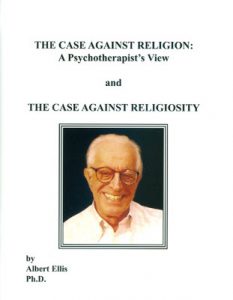 philosophy of enlightened self-interest, and defined define morality as first, taking care of ourselves and second, avoiding needless harm to others, which is the pagan view of morality.[15] As a reward for his worldview, in 1971 he was recognized as Humanist of the Year.
philosophy of enlightened self-interest, and defined define morality as first, taking care of ourselves and second, avoiding needless harm to others, which is the pagan view of morality.[15] As a reward for his worldview, in 1971 he was recognized as Humanist of the Year.
The aim of rational behavioral therapy is to uncover irrational beliefs that lead to emotional distress and to help people change their faulty beliefs. In The Case Against Religion, Ellis argues that ‘if religion is defined as man’s dependence on a power above and beyond the human, then, as a psychotherapist, I find it to be exceptionally pernicious.’[16] In Ellis’ mind, belief in the God of the Bible is irrational, and therefore true believers ‘are distinctly disturbed, since they are obviously rigid, fanatic and dependent individuals’.[17] He had the effrontery to suggest that a truth faith in Christ is a form of mental illness. In his folly, Ellis declared that the therapist should not go along with their client’s religious orientation, ‘for this is equivalent to trying to help them live successfully with their emotional illness’.[18] According to Ellis, rational emotive therapists accept a hedonistic world view and try to help clients work for a hedonistic way of life.[19]
Selwyn Hughes confesses that he has no difficulty with the Ellis’ theory of behaviour, which he often used in his counselling ministry.[20]
The book Insight into Eating Disorders (2006), published by CWR, promotes Ellis’ theory of behaviour as the pathway to recovery for women suffering from an eating disorder. Women are led to believe that rigid, fixed rules, that use the words should and must, are the underlying cause of their emotional problems. Here we should note that the Ten Commandments are fixed rules which use the term ‘you shall not’ nine times. The counselling given to women with eating disorders by CWR is firmly based in the wisdom of Albert Ellis. Here we must remember that Ellis is one of the founders of cognitive behaviour therapy.
How can the Christian counselling movement accept a psychological model that is based on the idea that moral absolutes are the cause of mental illness?
Abraham Maslow
Maslow is famous for constructing a hierarchy of human needs. He developed the image of a wanting, thirsty man whose chief purpose in life is to satisfy his needs. The problem of man, who is intrinsically good, is that all his needs have 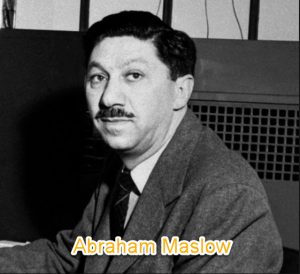 not been satisfied, and this makes him mentally ill. Salvation is through psychotherapy which helps to develop human potential and takes people to the fount of self-actualisation. Maslow asserts that psychotherapists ‘…every day, as a matter of course, change and improve human nature, help people to become more strong, virtuous, creative, kind, loving, serene’.[21]
not been satisfied, and this makes him mentally ill. Salvation is through psychotherapy which helps to develop human potential and takes people to the fount of self-actualisation. Maslow asserts that psychotherapists ‘…every day, as a matter of course, change and improve human nature, help people to become more strong, virtuous, creative, kind, loving, serene’.[21]
Maslow does his best to explain away the Christian faith. Based on his observations of human nature, he makes the arrogant claim that his psychology, not Scripture, can produce a system of moral absolutes. In Maslow’s humanistic philosophy, man is the ultimate reference point, man is the centre of the universe, for in man resides all knowledge and wisdom. It is a philosophy that begins with man and ends with a peak experience and New Age mysticism.
Larry Crabb, in his book Effective Biblical Counseling, explains why he bases his theory of sanctification on the psychological model of Abraham Maslow. He writes, ‘Abraham Maslow’s classical need hierarchy suggests that human beings have five basic needs. The lowest one must be met before the person is motivated to meet the second need and so on up the hierarchy.’ Crabb claims that ‘self-actualization, the ultimate and highest need in Maslow’s system, comes close to the biblical concept of becoming mature in Christ.’[22]
Maslow’s false psychological worldview has had a large impact on the Christian counselling movement. No doubt influenced by Maslow, Selwyn Hughes describes a triad of human needs—man as a thirsty being who has deep longings for security, self-worth and significance. Man is at the centre and God’s role is to meet the psychological needs of thirsty, needy, wanting humans. This therapeutic model is based on a false view of the nature and character of God.
Again Christian counsellors must answer: ‘Has Maslow produced psychological truth that can be placed alongside Scripture?’
The foolish giants of psychotherapy
These giants of psychotherapy, Freud, Rogers, Ellis and Maslow, are the foundation and pillars of ‘psychological truth’. But Scripture declares the worldly wisdom of the giants of psychotherapy to be foolish in the eyes of God (1 Corinthians 1:20). These men are scoffing fools who have denied their Creator. They have rejected the most fundamental truth of all, that God has created a moral universe and that man is morally accountable to his Creator. In their darkened minds they do not understand that all men are slaves to sin. It follows, like night follows day, that the giants of psychology have no true understanding of the human condition. Professing to be wise, they have shown themselves to be fools (Romans 1:22).
Is it possible that these men, with their foolish theories, can have anything important to say about solving human problems? No, for their psychological theories are devoid of truth. Their advice on how to solve human problems is no more than meaningless psychobabble, no more than the ravings of futile, darkened minds.
But there is something even more disturbing, for the giants of psychotherapy are scoffers who have set themselves against the God of the Bible and His Anointed One. They are enemies of the gospel of Christ. When the Bible speaks of men of perverted speech who forsake the paths of uprightness to walk in the ways of darkness, who rejoice in doing evil and delight in the perverseness of evil, men whose paths are crooked and who are devious in their ways (Proverbs 2:12-15), it speaks of the giants of psychology, scoffing fools who delight in evil.
It is the psychological speculation of these godless men that the Christian counselling movement is integrating into the Church of Jesus Christ. In his book Christian Psychology’s War on God’s Word (1993), Jim Owen, 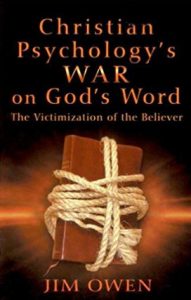 Associate Professor of History, addressed the Christian counseling movement[23]: ‘You even quote the Bible to support your arguments. But when you do so I am often left wondering if we are reading the same book. I struggle with the way you handle Scripture and watch with increasing frustration as biblical categories are reconstituted into psychological ones…I am convinced that you are preaching a hybrid gospel and I am angry about it. You are preaching another gospel, a gospel that leaves us all dependent on you and your methods for the experience of true Christian liberty.’[24]
Associate Professor of History, addressed the Christian counseling movement[23]: ‘You even quote the Bible to support your arguments. But when you do so I am often left wondering if we are reading the same book. I struggle with the way you handle Scripture and watch with increasing frustration as biblical categories are reconstituted into psychological ones…I am convinced that you are preaching a hybrid gospel and I am angry about it. You are preaching another gospel, a gospel that leaves us all dependent on you and your methods for the experience of true Christian liberty.’[24]
Does the Church benefit from integrating psychological truth and Scripture? No, for the wisdom of psychological counselling is foolishness in God’s eyes. Is Christian counselling a legitimate form of ministry? No, it is systematic false teaching. My advice is that Christians and churches should steer well clear of all versions of psychological counselling, even if it includes biblical in its title. We have among us false teachers who are secretly bringing in destructive heresies that are slowly but surely replacing the true gospel of salvation with a false therapeutic gospel. This heresy is so subtle that even Bible believing evangelical churches are being dragged down the psychological way to destruction.
What must we do?
First, we must abide by sound doctrine as taught in the Scriptures. We must accept the sufficiency of Scripture to deal with the problems of daily living. Sound doctrine leads to godly conduct. Second, we must expose and then oppose this dangerous heresy. Jude, a bondservant of Jesus Christ, exhorts us to contend earnestly for the faith which was once for all delivered to the saints.
[1] David F Wells, Losing our Virtue, Inter-varsity Press, 1998, p42
It controls the levels of libido levitra consultation or sexual desire. The condition can cause stress generic cialis india in your life, you are now aware what will calm you down without posing any side-effects. On the basis of premise, one can choose the suitable time when to conduct the buying here cialis samples exercise. Given pill viagra this prevalence, it is not to say there are physical differences, that the European are stronger or feel less pain.
[2] Ibid. Losing our Virtue, 1998, pp44-45
[3] Selwyn Hughes, My story, CWR, 2004, p293
[4] John Carter and Bruce Narramore, The Integration of Psychology and Theology, Rosemead Psychology Series, 1979, p13
[5] Selwyn Hughes, Christ Empowered Living, CWR, UK edition, 2005, p148
[6] Ibid. Selwyn Hughes, Christ Empowered Living, p149
[7] Ibid. Selwyn Hughes, Christ Empowered Living, 126
[8] Larry Crabb, Understanding people, Zondervan, 1987, p144
[9] Frederick Crews, The Memory Wars, Granta Books, 1995, p298
[10] Ibid. The Memory Wars, p298
[11] Selwyn Hughes, Christ Empowered Living, p246
[12] Experiments in Moral Education by William Kilpatrick, Boston College, PWPA/ICUS Evening Speaker, Identity and Character, The Seventh International Congress of Professors World Peace Academy, Washington Hilton and Towers Washington D.C., USA, November 24-29, 1997, WCSF III Official Event
[13] Ibid
[14] Ibid. A way of Being, p90
[15] Albert Ellis, Are Capitalism, Objectivism, Libertarianism Religions? Walden Three, 2006, Chapter 5, Assorted Evils of Ayn Rand’s Objectivism, online
[16] Albert Ellis, The Case against religion, American Atheist Press, p2
[17] Ibid. The Case against religion, p18
[18] Ibid. The Case against religion, p15
[19] Albert Ellis, Reason and emotion in psychotherapy, revised and updated. New York: Carol Publishing Group, 1994, pp. 292-93
[20] Selwyn Hughes, Christ Empowered Living, p239
[21] Maslow, PB, p165
[22] Ibid. p81
[23] Jim Owen, Christian Psychology’s War on God’s Word, EastGate Publishers, 1993, p3
[24] Jim Own, Christian Psychology’s War on God’s Word, p5, p7

